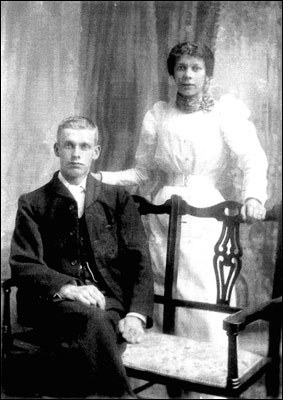Albert Bates (1879–1949)
Father
Albert was the illegitimate son of Deborah Bates and Charles Lawrence. He was 3 years old when his mother died, leaving him in the care of her elderly mother who died when he was 8. In 'Mary Fennell – A Memory' Mary recalls how her grandfather, Alfre Colton, used to light the old lady’s fire for her every morning and how one day he found Albert lying next to his grandmother, unaware she had died in the night. H.E. wrote this episode of his father’s history into the character of Adam in Charlotte’s Row.
Albert was then taken in by his father, Charles Lawrence, and began work as a half-timer, going to school in the mornings and to work at ‘Knight and Lawrence’, the boot and shoe factory in Rushden where his father was a partner, in the afternoons. Although he described himself as ‘a reluctant schoolboy’ when he left school at 13 his handwriting, general knowledge and grasp of mathematics was good enough for him to be asked to stay on as a teacher. Instead he chose to work full time at the factory, working his way up to become, firstly a ’clicker’, then the company’s travelling salesman for England, then Company Secretary, and eventually Director of Export. It may well have been his father’s partner, the upright and teetotal William Knight who gave Albert a sense of moral ambition and pride.
Albert became a pillar of respectability in the local Methodist community. His name is engraved on the brass plaque of the newly built Wesleyan Church on Park Road as one of its 22 founder members, and to his great pride the infant H.E. was the first child to be baptised in the new church. He was a deeply religious man, ‘not merely devoted to the Methodist faith, but positively locked in its uncompromising strait-jacket.’ (A Vanished World, p.27)
Image below: Albert and his wife Lucy Elizabeth (Lizzie) on holiday in Weston-Super-Mare.

Image above: Soldiers from the Royal Welch Fusiliers with H.E.'s parents, Albert and Lizzie, his grandparents, George and Priscilla, Lizzie's sister, Flo, and H.E. (cross-legged) with his sister, Edna
Although they argued vehemently and irreconcilably over the strictures of Methodism, H.E. and his father maintained a fondness and respect for one another all their lives. H.E. expressed his admiration for Albert most poignantly in the story, 'The House With The Grape Vine'.
Albert read well, collected a modest library and engendered in H.E. an early interest in books and learning. They shared a love of gardening, football and cricket. He also taught himself to read music and sang tenor in the church choir, eventually becoming both conductor and deputy director of music at the church. He also conducted and sang in a quartet that rehearsed at the family home in Essex Road, Rushden. The quartet performed at events such as H.E. describes in Love For Lydia. 'The Woman Who Had Imagination' and 'The Duet' also draw on H.E.’s memories of accompanying his father these musical excursions.
Albert was also a good gardener. Later in life H.E. recalled his father’s Madonna lilies, which grew ‘5 to 6 feet high’, in the family garden, on Grove Road. ‘There was nothing remarkable about the loving attention my father bestowed on that absurd back-yard bed-sheet. It was very natural’, wrote H.E., ‘he would not have considered doing otherwise. He was obeying an instinct he did not stop to analyse or question.’

Most importantly, perhaps, Albert and H.E. walked together. ‘My father pursued his passion for nature and the country-side, and incidentally fostered my own, by doing a vast amount of walking – oh! how we walked. Winter and summer we tramped, by Shanks’s Pony, the bus-less, motor-less roads, the footpaths, the blackberry hedges, the river towpaths, the woodland ridings, mostly in Bedfordshire, my father striding out athletically, I desperately struggling to keep up... To this day the joy of these walks remains... If I have nothing else to thank my father for – and I have a very great deal – this in itself would be enough.’ (A Vanished World, p.30)
H.E. writes about his father at length in 'Shoemakers Remembered' and characterisations of Albert appear in Love For Lydia, and The Poacher.
H.E. dedicated his first novel, The Two Sisters, ‘To my mother and father’.